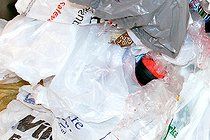Italy follows China’s example and bans plastic bags.
At the start of the New Year Italy has announced that it is banning plastic bags from shops and supermarkets, in a move towards a greener future.

At the start of the New Year Italy has announced that it is banning plastic bags from shops and supermarkets, in a move towards a greener future.
Italy uses 25 per cent of Europe's plastic bags, which accounts for 25 million bags used per year.
Two years ago China banned plastic bags keeping 200 million plastic bags from landfills. Washington DC enacted a plastic bag tax, which has also spared millions of bags a month from landfill sites, a great feat for a country so slow to join the green bandwagon.
Italians use 200 million plastic bags a year. People fear that moving to paper bags will be less than popular as they are easily breakable and are not the ideal carrier bag when on Italy's most famous transport mode - the bicycle or moped.
While the ban continues to be unpopular among the public, the Italian government is standing firm. Environment Minister Stefania Prestigiacomo said: "This marks a key step forward in the fight against pollution and it makes us all more responsible in terms of recycling."
Italian shoppers will now be offered a paper bag, biodegradable plastic bag or the option of buying a fabric bag.
Supporters of the ban say plastic bags are environmental hazards which survive for hundreds of years.
Vittorio Cogliati Dezza, of environmental group Legambiente, said the use of biodegradable and paper or traditional net bags would be of "immense benefit to the country and future generations."
Environmental campaigners say that more than 180,000 tonnes of oil and substantial CO2 emissions will be prevented by the government's measures.
The government has created a public awareness campaign, promoting new bags as fashionable with the added bonus of being environmentally friendly.
Plastic bags will still be available free of charge from shops until they run out, however they will be encouraged to move to the new environmentally friendly versions as soon as possible.
Campaigners are hoping that with more and more nations introducing environmental taxes and measures, more countries will follow suit.
Author: Charity Knight | Climate Action
Image: swanksalot | flickr




_-_frame_at_0m5s_400_250_80_s_c1.jpg)

